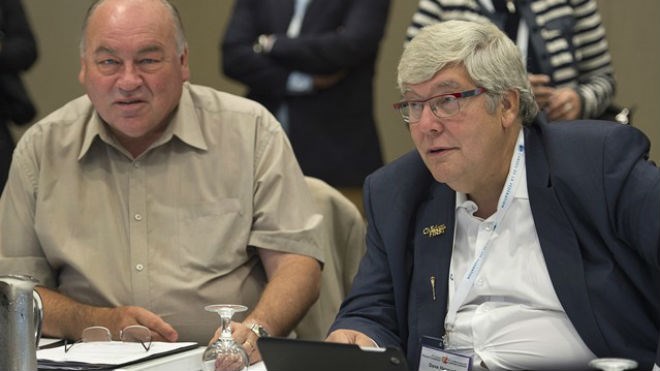CHARLOTTETOWN - Canada's premiers agreed to move forward on a national energy strategy Friday after years of trying to reach a consensus on the plan.
Premier Robert Ghiz of Prince Edward Island said all provinces are now on board with the idea as he concluded three days of meetings in Charlottetown as chairman of their annual conference.
The provinces have been talking about a national energy strategy for years, with Alberta leading the way. Quebec and British Columbia have resisted signing on.
But those barriers were overcome with a switch to a federalist Liberal government in Quebec in April and B.C. Premier Christy Clark dropping her objections last November.
"I am extremely happy that our government is joining," said Quebec Premier Philippe Couillard after the meeting.
"We want Canadians to have access to energy of all kinds from the West Coast to the East Coast to the North."
Couillard said his concerns about jurisdiction and the link between energy and climate change were put at ease after discussions with his provincial counterparts.
Clark also announced earlier that Saskatchewan had agreed to drop trade barriers that kept B.C. wine and craft spirits from being sold in that province. B.C. already allows other provinces to sell wine in the province.
Clark said she expects Ontario to open its borders to B.C. wine as well.
"Premier (Kathleen) Wynne is talking about making this happen and I think we could probably do it in a few months," she said.
"I'm hopeful that by the next meeting of Canada's premiers, Canada's borders will be open for wine right across this country."
British Columbia's deal with Saskatchewan will allow consumers in both provinces to order B.C. or Saskatchewan wines and craft spirits directly from producers and have them delivered to their homes.
Clark said she hopes to see the agreement implemented next June.
British Columbia has already struck similar deals with Manitoba and Nova Scotia.
Join Sudbury.com+
- Messages
- Post a Listing
- Your Listings
- Your Profile
- Your Subscriptions
- Your Likes
- Your Business
- Support Local News
- Payment History
Sudbury.com+ members
Already a +member?
Not a +member?
Sign up for a Sudbury.com+ account for instant access to upcoming contests, local offers, auctions and so much more.
